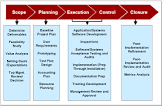Project Management Practices
Project management is a critical discipline that involves planning, organizing, and executing projects effectively and efficiently to achieve specific goals and objectives. Successful project management requires the implementation of best practices to ensure that projects are completed on time, within budget, and to the satisfaction of stakeholders.
Here are some key project management practices that can help ensure the success of your projects:
- Clear Project Objectives: Define clear and achievable project objectives at the outset to provide direction and focus for the project team.
- Comprehensive Planning: Develop a detailed project plan that outlines tasks, timelines, resources, and dependencies to guide project execution.
- Risk Management: Identify potential risks early in the project lifecycle and develop strategies to mitigate or manage them effectively.
- Effective Communication: Maintain open and transparent communication channels with all stakeholders to ensure alignment and collaboration throughout the project.
- Stakeholder Engagement: Engage key stakeholders throughout the project lifecycle to gather feedback, address concerns, and ensure their buy-in.
- Resource Allocation: Allocate resources efficiently based on project requirements to optimize productivity and avoid resource constraints.
- Monitoring and Control: Regularly monitor project progress against milestones, budgets, and quality standards to identify issues early and take corrective action as needed.
- Adaptability: Be prepared to adapt plans and strategies in response to changing circumstances or unexpected challenges that may arise during the project.
Incorporating these best practices into your project management approach can help increase the likelihood of successful project outcomes. By following established guidelines and principles, you can enhance your ability to deliver projects that meet or exceed stakeholder expectations while maintaining high standards of quality and efficiency.
Remember that effective project management is an ongoing process that requires continuous improvement and learning. By embracing best practices and staying informed about industry trends, you can elevate your project management capabilities and drive success in your projects.
Six Essential Project Management Practices for Successful Outcomes
- Clearly define project goals and objectives.
- Create a detailed project plan with clear timelines and milestones.
- Communicate effectively with all stakeholders throughout the project.
- Regularly monitor and track progress against the project plan.
- Identify and manage risks proactively to avoid potential issues.
- Conduct thorough post-project evaluations to learn from successes and failures.
Clearly define project goals and objectives.
One of the fundamental tips in project management practices is to clearly define project goals and objectives. By establishing precise and achievable goals at the outset of a project, teams can align their efforts towards a common purpose and set a clear direction for project execution. Clear definition of goals helps in providing focus, guiding decision-making, and enabling effective communication among team members and stakeholders. When project goals are well-defined, it becomes easier to track progress, measure success, and ensure that the project delivers value in line with stakeholders’ expectations.
Create a detailed project plan with clear timelines and milestones.
Creating a detailed project plan with clear timelines and milestones is a crucial tip in project management practices. By outlining specific timelines for each task and establishing key milestones, project managers can effectively track progress, identify potential bottlenecks, and ensure that the project stays on schedule. Clear timelines and milestones provide a roadmap for the project team, helping to maintain focus, allocate resources efficiently, and communicate expectations to stakeholders. This practice promotes accountability, transparency, and alignment throughout the project lifecycle, ultimately increasing the likelihood of successful project delivery within scope, time, and budget constraints.
Communicate effectively with all stakeholders throughout the project.
Effective communication with all stakeholders throughout the project is a crucial project management practice that can significantly impact the success of a project. By maintaining open and transparent communication channels, project managers can ensure that all stakeholders are informed, engaged, and aligned with the project’s goals and progress. Regular updates, feedback sessions, and clear documentation help to foster collaboration, build trust, and address any issues or concerns in a timely manner. Effective communication not only enhances stakeholder satisfaction but also promotes a culture of accountability and teamwork, ultimately leading to more successful project outcomes.
Regularly monitor and track progress against the project plan.
Regularly monitoring and tracking progress against the project plan is a crucial project management practice that helps ensure projects stay on track and meet their objectives. By consistently reviewing key milestones, timelines, and resource allocations, project managers can identify any deviations or issues early on and take proactive measures to address them. This practice enables teams to maintain visibility into project progress, make informed decisions, and adjust plans as needed to keep the project moving forward smoothly and successfully.
Identify and manage risks proactively to avoid potential issues.
Identifying and managing risks proactively is a crucial aspect of effective project management practices. By anticipating potential issues and developing strategies to mitigate or address them early on, project managers can significantly reduce the likelihood of disruptions or setbacks during project execution. Proactive risk management not only helps in avoiding costly delays but also enables project teams to maintain focus on key objectives and deliverables, ultimately enhancing the overall success of the project.
Conduct thorough post-project evaluations to learn from successes and failures.
Conducting thorough post-project evaluations is a crucial aspect of effective project management practices. By analysing both the successes and failures of a project, valuable insights can be gained to improve future project outcomes. Reflecting on what went well helps in identifying best practices that can be replicated in future projects, while examining failures provides opportunities for learning and making necessary adjustments to prevent similar issues from arising again. Post-project evaluations serve as a valuable tool for continuous improvement, enabling project managers and teams to enhance their skills, processes, and strategies for better project performance in the future.

